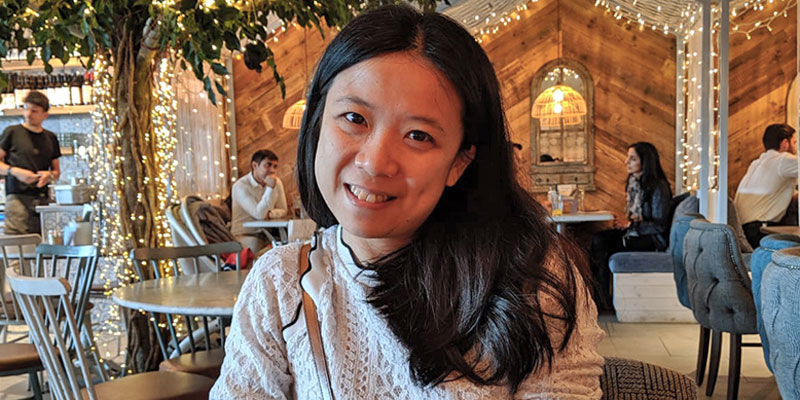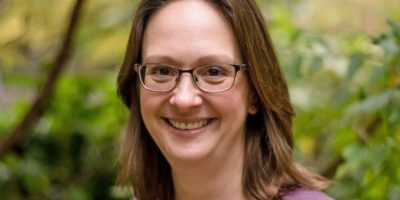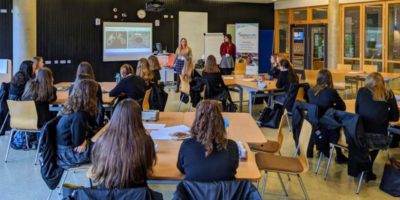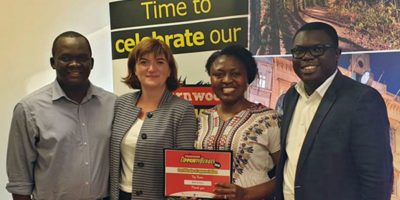Karrie Liu is a freelance analytics consultant and Chartered Mathematician, as well as being a council member and Fellow of the Institute for Mathematics and Its Applications (IMA). Karrie is passionate about improving people’s lives, having previously spent ten years working in the NHS, and provides statistical support for clean water programmes for India’s WaterHarvest Charity. She has previously worked for the IMA with the early career mathematicians, and spoken at New Scientist Live, as well as taking part in mathematics outreach activities organised by the National STEM Learning Network, Action Tutoring, and the Stemettes.
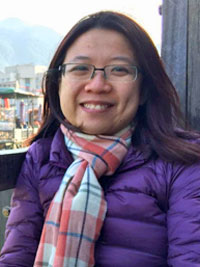
“My skill set is about maths, so I want to use it to do good things for the world and show girls they can do the same.”
Discovering epidemiology
I got two master’s degrees in maths, one in maths with modern applications, from the University of York and another in statistical epidemiology from the University of Leeds.
After I did my undergraduate degree in mathematics already in the UK, I decided to take a year out to figure out what was best to do next, so I worked in the Department of Health for a year. At that time, I realised that I enjoyed working there, but I felt like my skills were not developed enough for that job. I therefore just wanted to learn and study more. That is why I decided to apply for my first master’s degree.
Afterwards, I started working for the NHS and realised that something called epidemiology was quite fun! So, I asked my boss if I could do another master’s degree, as I couldn’t really do a PhD because I was a foreign student and I wouldn’t have been able to get the funding for it. The NHS paid for me to do this second master’s and I have been using maths throughout my entire career since.
Why working in healthcare is so close to my heart
My career can be split into three categories – healthcare, freelancing, and charity work. Firstly, I got into healthcare because when I was in my first year of university my grandmother passed away whilst being treated by an ambulance crew. Since then, I wanted to do something healthcare-related. I wanted to know what happened that day. Why did she pass away? Could something have been done to prevent it? Would she have been OK if she had received more support?
That is why I firstly worked for the NHS and I stayed there for ten years. I wanted to know more about the health service. I was fortunate enough to work in the Ambulance Service for a year, alongside clinicians who were receiving 999 calls. and I was able to learn more about the support provided to patients.
How a chance meeting on a train led to consultancy opportunities
I kept working for the NHS for ten years, but one day I was on a train from Leeds to London and I saw a man looking at his laptop with a terrified expression. I then realised he was looking at some mathematical equations in Excel. So, I decided to introduce myself and ask if he needed help.
After much chitchat, he told me he was the director of a consultancy company (IQVIA), which had the NHS as a client. He asked me what I did, so I told him all about my love for maths and the NHS. He invited me to go talk to his team about my experience. I didn’t realise this was a job interview, but after I visited the company, he rang me asking if I wanted a job in London.
It was a consultancy job, which I had never done, and I had to move to London, but it was a very good pay rise and I was young, so I decided to go for it and try something different. I worked for that company for three years, having the NHS and pharmaceutical companies as clients.
My job was to look into the mathematics of these companies to see how I could make people understand it better. The job required me to have a high energy level at all times, which led me to feel very tired, and felt like I had given my all.
I was working on a project with a pharmaceutical company called Boehringer Ingelheim. I decided to leave the consultancy company, and the project manager at Boehringer heard. He asked me what I wanted to do next. I told him about freelancing, so he gave me a freelance project to work on for six months! It was a great way to get some money going and having time to figure out what I wanted to do next.
Using my skills to improve lives through international charities
Besides working in healthcare and doing freelancing work, I also take some time to help charities. At the moment, I’m working for seven different charities, doing different things.
One of them is called WaterHarvest, a charity that helps remote communities in India to build structures to catch and store rainwater, giving them clean water at home all year round. They first reached out to me because they wanted to build a tank and understand if people would find it useful, through a survey, but they didn’t know where to start or how to set up the questionnaire. So, I helped them setting it up and collecting the respondents’ data.
Since then, I have been helping them to analyse this and trying to get more funding for their next project, still in India. I decided to help them even though I wasn’t paid, because they want to improve Indian people’s health quality, giving them clean water, which is obviously incredibly important.
Unfortunately, girls are not always deemed to be equal to or as important as boys in India. When Indian families need to get clean water from the river they would usually ask a girl to get it, never the boy, because they think he is more important so he should have more time to go to school. So, most girls have to take four hours of their day to go to the river and come back. This project saves time for girls and gives them the opportunity to get into education. That is why I find it so important.
Show girls they can follow my lead into mathematics
I think it is important for me to help WaterHarvest because it makes me a role model for other girls. My skill set is maths, so I want to use it to do good things for the world and show girls they can do the same.
I know that a lot of people, especially with COVID-19, want to do charity work, but never know how to go about it. I hope I can help other people connect with charities who need their skills, as I know it’s often hard. If someone knows they want to do charity work but don’t know which charity to choose, they can just talk to me and I can point them in the right direction.
Another thing I want to do to help people is to take interns to work with me. When I was at university, I found it really hard to get an internship, so I want to be able to give that opportunity to one or two young people. Fingers crossed I can do it one day.
Splitting my time between commercial and charitable work
I normally work ten hours a week. On Monday, Tuesday and Wednesday I work for my ‘prime’ clients, pharmaceutical companies that I charge them the market rate.
On Thursday afternoons I help another charity called BuddyHub which was set up during COVID-19 times. Elderly people don’t really know how to use phone apps so the charity is trying to figure out how to build an app with an algorithm that ‘matches’ people from the same community, with similar ages and similar interests, to form a ‘support bubble’.
Even if you can’t see your family and friends during the lockdown, you can at least have a friend from the same community who shares the same interest as you so you can look after each other.
I also help a society about women in maths called Stemettes. I teach girls why is maths is important and what careers it can lead to. I also present data analysis to them for about two or three hours a week.
The changing way we work
I normally worked in an office, from nine to five. However, because of COVID-19 now working patterns are changing and we are more encouraged to use technology to work. This is a good thing for me as I like to work from home.
A bad thing is that I cannot work on some of my projects anymore. I work for hospitals quite a lot, so some of my projects are about patient information but because of data protection laws, I can only work on patient information at the hospital, so that project had to be put on hold.
Looking on the bright side, I am now able to be more creative at work. I work for a pharmaceutical company and I’m looking at how they can make more sales. Normally we use the last five years’ sales trends, but now COVID-19 has completely changed the world and you cannot predict those trends from the past.
This means I am now able to use a more academic field theory and take a more creative approach to predict the trends, because no one knows when the pandemic will end, and even if we did, we wouldn’t know how people’s buying habits and healthcare style would change.
Another thing that has changed for me is human interaction. When you have new people at work, you want to meet them. I find it easier to meet up face-to-face or over coffee, but now, in a video call, it’s more like: I see you, but I cannot feel your presence.
Not the usual suspect!
I’m a passionate supporter of the Institute of Mathematics and its Applications but maths has typically been perceived as quite a male-dominated subject. Therefore, they have been trying to make their institute more inclusive, and that is why I was invited to join their council.
I’m a young female immigrant, good at maths, but I’m not an academic person. I got a master’s degree from the University of York, rather than Oxbridge. They wanted someone young from the industry to tell them how maths can be used from different angles. My profile looked different from the people they usually worked with.
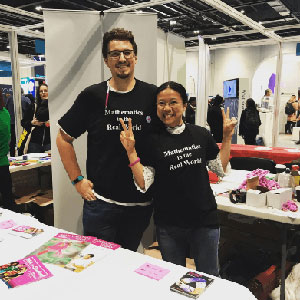
Also, I was chair of their Early Career Mathematician’s Committee for three years, which helped me understand how the industry works. I am the voice who advises on the curriculum at universities, for example on whether something is outdated because we don’t use that practically anymore.
I also provide ideas about social media and online presence, which enables me to give a younger flavour to the Institute.
I am more than good enough
Being part of the Top 100 Women in Tech 2019 has done so much to help me showcase both my charity and freelance work.
But I cried like a baby when I received the award though because the first thing my father asked me was: “How much money do you get after winning the award?” I was shocked and explained to him this was an achievement. He then replied: “If there is no money, what is the point of doing it?” I was not angry at all but felt upset and slightly disappointed.
The Chinese culture is focused more on boys and measuring success with money, but receiving this award was a huge achievement for me. It’s something that shows people I’m good at what I do. At first, my father told me that maths couldn’t be a career for me because it is not something traditional. Now that I am showing him I can absolutely have a very successful career in maths.
Supporting other young South Asian women
In Asia, girls are sometimes not made to feel important and aren’t always encouraged to accomplish big things. Girls can be told they cannot pursue career success because this might stop them from meeting a man and getting married.
I’m telling this story about my father to the world, which upsets me a lot and I still feel pain when I talk about it, because I want to let all South Asian young women that yes, we come from a background where unfortunately boys are more often perceived as more important than girls, but we can get through it together.
Even when you are discouraged and disheartened, remember that you are not alone. People like me can share their story, and tell you that actually, it’s not your fault, you haven’t done anything wrong.
Parents are supposed to be the ones who love you, but sometimes they just don’t understand, because of their generation, which is so hard-working, and they just want to make sure that you don’t need to worry about putting food on the table, they want you to make sure you’ve got enough to survive.
Advice for girls about where to get started with maths careers
There is a website called Maths Career where they have got more than 100 profiles of different people describing what they do. Not just professors or people with PhDs, but all different kinds of people with an industry background. So, I would say: if you want to get inspiration, check that website.
Then, you can also join the IMA’s Early Career Mathematician Committee, even at university or while doing A-levels. They have different meetings about advanced mathematic theory, but some of them are quite general, so you can learn how you can use maths for different things.
Also, now LinkedIn is a really good way to get into a career in maths because you can just reach out to someone influential and ask them for tips. Some girls, and boys as well, have reached out to me since I won that award in 2019.
I find it doesn’t work if you try to connect with people randomly, but if you first tell them you are a mathematician, you find their role interesting, and just want to know more, they will talk to you. Don’t be afraid to ask what you want, there is no such thing as a stupid question.
Presenting my work to more charities
Moving forward I’m just trying to balance my freelance and charity work, and to figure out what is next. Fingers crossed I will have got enough projects to keep me doing what I’m doing. I also need to figure out a more systematic way to help charities by getting more mathematicians like me to volunteer too.
I also have to continue promoting my work because many charities don’t usually realise they need mathematicians. If they have someone like us, their skillset improves and that can only be a positive thing.

